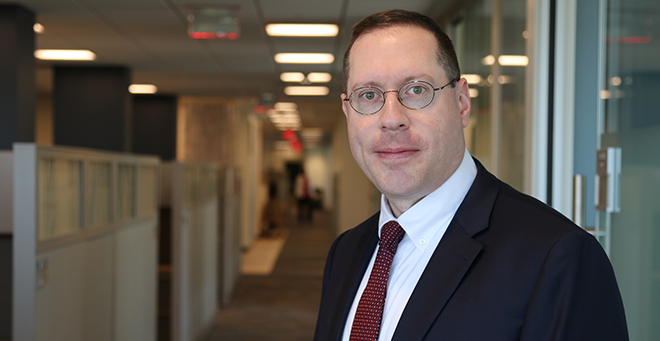The results of a nationwide, multicenter clinical trial from Johns Hopkins Medicine indicates that the use of plasma from convalescent patients — those who have recovered from the disease and whose blood contains antibodies against SARS-CoV-2, the virus that causes COVID-19 — is effective as an early treatment. The research suggests that convalescent plasma reduced the risk of hospitalization by more than half for outpatients with COVID-19 who participated in the study.

The findings were posted Dec. 21 on the preprint website MedRxiv, where investigators may share research related to COVID-19 prior to peer-reviewed journal publication. Jonathan M. Gerber, MD, the Eleanor Eustis Farrington Chair in Cancer Research, professor of medicine, chief of the Division of Hematology/Oncology in the Department of Medicine and medical director of the UMass Cancer Center is one of the co-authors on the study.
“As the changing, often unpredictable landscape of the COVID-19 pandemic demands multiple treatment options — especially in low- and middle-income nations where frontline therapies, such as vaccines and monoclonal antibodies, may not be readily available — our study provides solid evidence that antibody-rich convalescent plasma should be part of the outpatient arsenal,” said study co-lead author David Sullivan, MD, professor of molecular microbiology and immunology at the Johns Hopkins Bloomberg School of Public Health, in a news release from Johns Hopkins.
In the study, conducted between June 2020 and October 2021, researchers at more than 20 sites across the U.S. provided 1,181 randomized patients with one dose each of either convalescent plasma containing antibodies specific to SARS-CoV-2; or placebo (plasma with no SARS-CoV-2 antibodies). The patients had tested positive for SARS-CoV-2 within eight days prior to transfusion. A successful therapy was defined as a patient not requiring hospitalization within 28 days after plasma transfusion.
The study found that just 17 patients out of 592 (2.9 percent) who received the convalescent plasma required hospitalization within 28 days of their transfusion, compared to 37 out of 589 (6.3 percent) who required hospitalization after receiving the placebo control plasma. This translated to a relative risk reduction for hospitalization of 54 percent.
“With early administration of high-titer SARS-CoV-2 convalescent plasma reducing outpatient hospitalizations by more than 50 percent, our findings suggest that this is another effective treatment for COVID-19 with the advantages being low cost, wide availability and rapid resilience to the evolving SARS-CoV-2,” said study co-lead author Kelly Gebo, MD, MPH, professor of medicine at the Johns Hopkins University School of Medicine in the release.
“We believe that the best role for COVID-19 high-titer convalescent plasma is extending its use to early outpatient treatment when other therapies, such as monoclonal antibodies or drugs, are either not readily available — as in low- and middle-income countries — or ineffective — as with SARS-CoV-2 variants that are resistant to certain monoclonal antibodies,” Dr. Gebo said.
Related story on UMassMed News:
UMass Medical School researchers ramp up COVID-19 convalescent plasma study